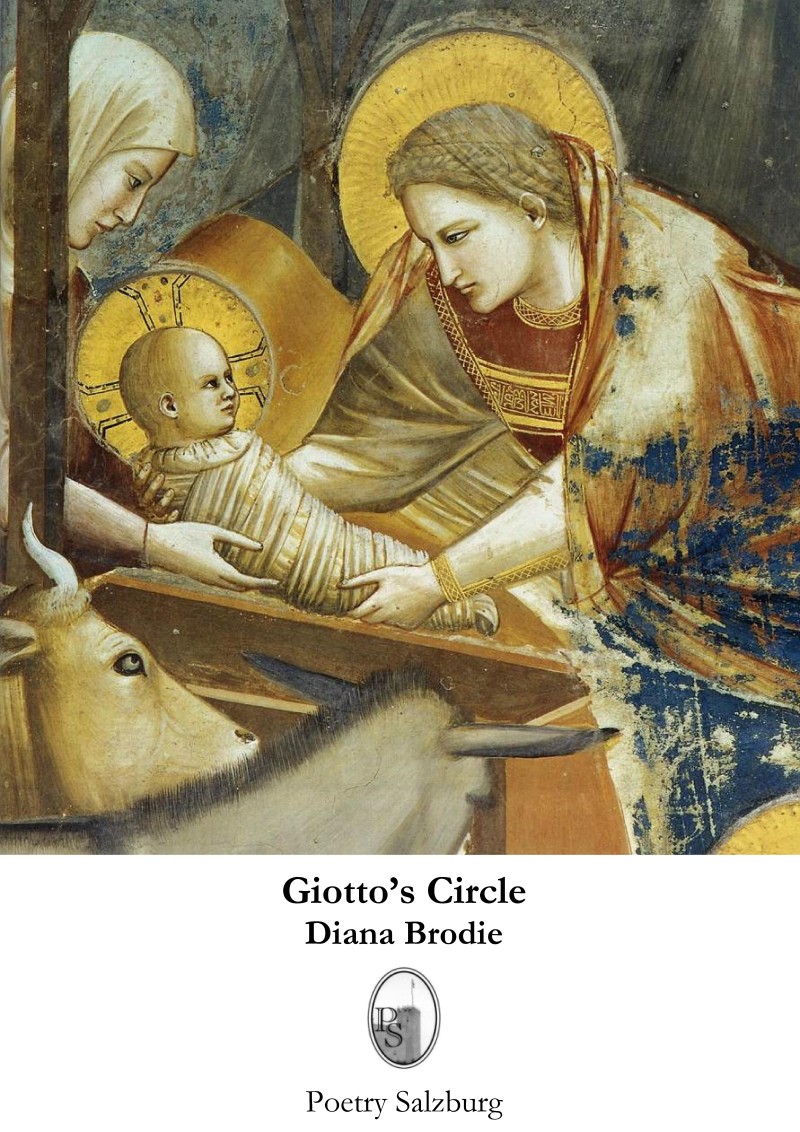 | Diana Brodie
Giotto's CircleAugust 2013. 96 pp. ISBN-13 978-3-901993-41-1
£10.50 (+ 2.00 p&p), €13.00 (+ 2.50 p&p), US$ 18.00 (+ 3.00 p&p)
"In Diana Brodie's gutsy first collection, the constraints and repressions of post-war society in suburban New Zealandare brought vividly to life. Against this atmosphere of conformity, the darker microcosm of a family life gone sour isplayed out. Brodie brings an emotional pressure to bear on this material, the poems' spare language and formal constraintskeeping the lid on simmering hurts and resentments. But what makes the collection stand out is her willingness to take anaxe to this 'frozen sea', 'to smash our way out'. Alongside the poems of quotidian detail are diversions into myth andfairytale: matadors, angels and earthquakes find a place here where the imagination is a means of 'jumping ship'. The pastmay seem to trap us in its cycle of grief but in the 'poem's unravelling circle' Brodie finds a way - if not of breakingcompletely free - at least of moving forward, line by powerful line." Esther Morgan
"Diana Brodie's poems are haunted by deaths, losses and moments of shock followed by years of stoical acceptance inwhich the shock takes shape. The moments are sharp and cumulative. Sometimes they impinge on histories beyond the personal,fitting into time's shadow, at other times they view human fate on a broader geographical map. The words are precise and fullof irony. 'From the dark hall, we heard the clack / of plates being counted out. / Grandmother had already / put thefinishing touches to lunch / and to daring new interpretations of happiness.' she writes in 'Counting the Change', that last line holding the balance between irony and pathos on a delicate knife-edge."George Szirtes |
Order copies of Giotto's Circle via PayPal:
Table of Contents
Excerpts from Giotto's Circle
Giotto's Circle
An O
drawn freehand, his arm
used as compass, his brush
dipped in blood red,
the round completed,
ends predicted in beginnings
which is enough.
But No! the messenger splutters.
Such a paltry thing! for he's uneasy
that he must ride back to Rome
to deliver to His Holiness this feeble gift.
His bellow, clenching fist,
shoulders shaking beneath
their crimson cape, the infinite
height of the papal throne.
I leave the middle chamber
of the Scrovegni Chapel,
enter the hush
of the frescoed circle,
endure the shock
of shaken crimson
staining wood,
breathe the azure
of the painted sky,
breathe the stars.
Angel of the East
Light-years had passed since his leaving.
He had landed. Was there a message
to deliver? An Annunciation? On the coldest
night of the year, the ambiguous angel crouched
on the roof of the Dresden shoe factory,
awaiting enlightenment, for why he had
come and what was now expected of him
he could no longer remember.
Throbbing wing-beats
dissolved to a mere tinnitus of memory;
celestial sky-dazzle of sun, stars, moon
spilled through the back of his eyes.
He sucked snow to refresh his soured breath,
brushed flakes from his eyes like tears.
But in the coming he had cast a fine figure:
burnished halo levitating over golden tresses,
the pearly gloss of his outstretched wings.
And the air rush as he plunged, the joy of it.
The Last Time
The last time I saw her, I told her
he was dead. But this morning,
surrounded by wedding guests
in the sun-speckled churchyard, she -
looking spectacular in her white dress,
fizzing with lace and happiness - forgot,
and asked me why he was not with me,
where he was today.
It seemed wrong to spoil the moment,
and despite the tombstones
that surrounded us, inappropriate to say.
He's travelling, I said, which
perhaps is true. To lie well, you must
first convince yourself. But when I
came home I was not prepared
to find him sitting in his favourite chair,
rocking gently, smoking,
reading Flaubert.
Reviews of Giotto's Circle
"Unflamboyant in language yet capable of the memorable phrase this is a poetry which reflects a serious and intelligentmind and grows out of, it seems, a rich experience of life, and in which the daily factual exists in a constant interplaywith the archetypal, with the idioms of myth and folk tale. [A] collection I can recommend with enthusiasm."
Glyn Pursglove, Acumen 77 (September 2013).
"The 65 poems have cumulative power, improved by each other's company. Though there are few knock-out pieces, thereare few if any duds. The 65 poems (villanelles, sonnets, rhyming couplets, and terza rima as well as free verse;from Agenda, The Rialto, Smiths Knoll, etc) are loosely organised into 7 sections whose titles areadapted from lines in the poems."
Tim Love
Click here to read the full review.
"Verse structure is nicely varied throughout the text. There is a fine series of broken sonnets ('Song of the Apprentice Angel')as well as other uses of sonnet form. The poet has a great affinity with triplets: she plays with them and seemsto turn to them as a relaxed setting where she is at ease and enjoying herself."
Mary Cresswell, Poetry New Zealand Yearbook 2 (Nov. 2015): 224-226.
An Interview with Diana Brodie
Read more about Diana Brodie
Send an e-mail to order this book
